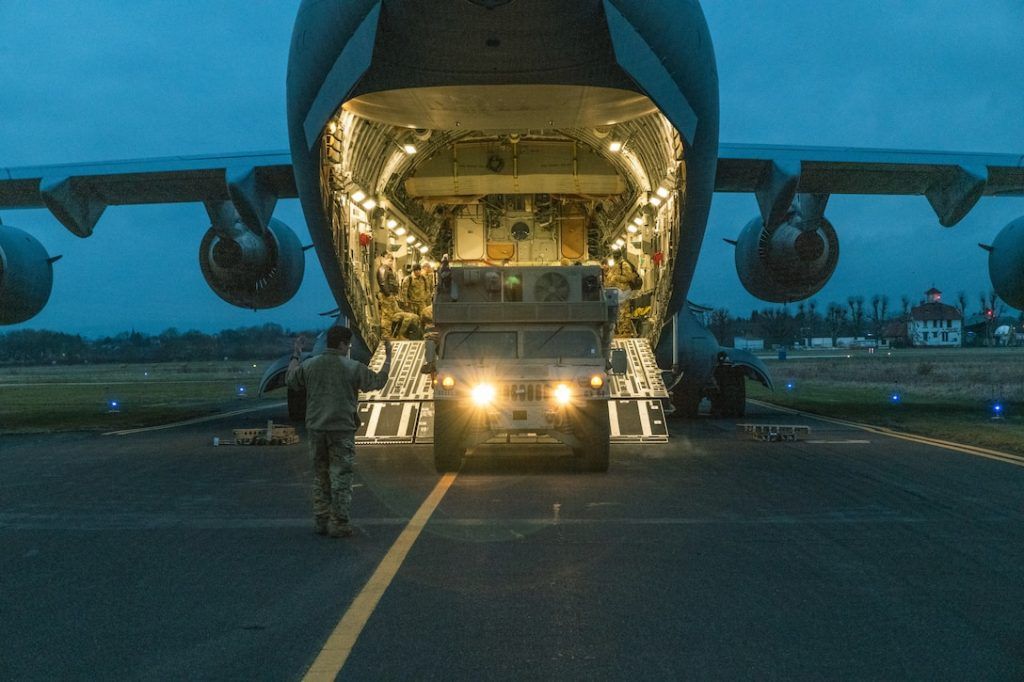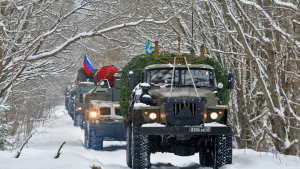“Get out now:” US closes Kyiv embassy and warns of imminent invasion amid Russia-Ukraine crisis
By Susan D’Agostino, John Mecklin | February 11, 2022
 The first of 2,000 soldiers arrive in Wiesbaden, Germany, following the Pentagon’s announcement of additional forces moving from the U.S. to Europe to reinforce NATO’s eastern flank, Feb. 4, 2022. https://www.defense.gov/Multimedia/Photos/igphoto/2002934581/
The first of 2,000 soldiers arrive in Wiesbaden, Germany, following the Pentagon’s announcement of additional forces moving from the U.S. to Europe to reinforce NATO’s eastern flank, Feb. 4, 2022. https://www.defense.gov/Multimedia/Photos/igphoto/2002934581/
Editor’s note: This article was originally published on February 11 and updated on February 14.
During a virtual panel discussion earlier this week, Frank Langfitt, National Public Radio’s London correspondent, offered a suggestion, based on his global reporting experiences, about what to listen for in US State Department messaging on the possibility of a Russian invasion of Ukraine. US Secretary of State Antony Blinken’s January 26 message, which urged US citizens to “strongly consider leaving” Kyiv, did not alarm Langfitt.
“‘Consider leaving’ is not the same as ‘get out now.’ The fact that they haven’t said that yet is actually very telling,” Langfitt said yesterday. “I go to every place the State Department tells me not to go and nothing ever goes wrong. … If they change that phraseology, … I’ll tell you, there will be people heading to the airports. I’ve been in countries where that’s happened. That’s when the light switch changes.”
Friday morning, US National Security Advisor Jake Sullivan told citizens to “leave as soon as possible”—a phrase that sounds an awful lot like “get out now.”

The Biden administration warned last week that Russian forces massed on Ukraine’s borders could launch an invasion of that country at “any time.” US officials have used similar language in describing the Ukraine situation for some time, but Sullivan’s announcement that Americans should leave Ukraine immediately if possible, and in any event in the next 24 to 48 hours, was new. And on Monday, Blinken announced that the United States would temporarily close its embassy in the Ukrainian capital of Kyiv and move embassy operations to Lviv, a city just 40 miles from the border with Poland. With the move, embassy staff would be hundreds of miles west of Russian troops massed in Belarus and Russia.
The Biden administration was not saying that Russian President Vladimir Putin had decided to invade, Sullivan said. “What we are saying, is that we … have a sufficient level of concern based on what we’re seeing on the ground and what our intelligence analysts have picked up, that we are sending this clear message, and it remains a message that we have now been sending for some time,” he said.
Sullivan’s comments came on a day when President Biden had an hour-long call with European leaders and NATO officials to discuss Russia and Ukraine. The UK also advised its citizens to leave Ukraine, CNN reported.
New satellite images show that Russia has now surrounded Ukraine on three sides. But what to make of this fact depends on where in the world you are.
In an online presentation called On Front Line World Briefing: War in Ukraine on Thursday, experts and journalists explained how and why the Russia-Ukraine crisis looked different to different observers, in and out of the country. Despite the warnings on Friday that US citizens should immediately depart Ukraine, considerable uncertainty about what would happen remained, in part because of Russia’s communications strategy.
“Fake news is sometimes the least of the problem,” Natalia Antelava, a journalist speaking from Tbilisi, Georgia, said. “It’s the fake narratives that have been constructed and are being constructed that a journalist somehow needs to puncture through.” Antelava is the editor-in-chief of Coda Story and a former resident correspondent with the BBC who covered the Russian invasion of Georgia in 2008 and the war in Eastern Ukraine. She is concerned that the current crisis on the Russia-Ukraine border is being framed as a crisis between Russia and the United States.
“We keep talking about ‘if Russia invades,’” Antelava said. “We forget that Russia has already invaded. … Ukraine is home to Europe’s only active war zone. … We can’t let that slip out from the narrative.”
Patrick Reevell, a panelist who spoke from Kyiv, is the Moscow correspondent for the US TV channel ABC News. He contrasted this Western narrative of the conflict with the one embraced by many of his Russian friends and colleagues.
“People [in the West] talk about whether there’ll be a climb-down for Putin,” Reevell said. “In Russia, people don’t think he ever climbed up.” He notes the conflict “simply wasn’t in the media” in Russia until recently. Even now, as more Russians tune in, he says that many believe that the Western media has pushed a false narrative.
Meanwhile, Andrey Kurkov, a Ukrainian novelist who writes in Russian and Ukrainian, told a story of Ukrainians going about their normal lives. He spoke of Ukrainans who are embracing the spirit of widerstand—“resistance” in German—by filling their lives with more activity than usual. “I think it’s very important, actually, for Ukrainians to make plans for the summer.”
In summer, many Ukrainians enjoy barbeques—an activity President Zelensky promised citizens in January—even as the border conflict escalated.
“Tone deaf” and “patronizing” were how Olga Rudenko, editor-in-chief of The Kyiv Independent, characterized those words. She pointed out that, not long after President Zelensky spoke of barbeques, US President Biden said that war was “imminent.” Rudenko suggested that Zelensky, who has worked as an actor and owned a television channel, should be better at communicating.
“We kind of expect him to know what to say and how to say it,” Rudenko said of the actor-turned-president. “That’s the opposite of what we’re getting most of the time.”
Together, we make the world safer.
The Bulletin elevates expert voices above the noise. But as an independent nonprofit organization, our operations depend on the support of readers like you. Help us continue to deliver quality journalism that holds leaders accountable. Your support of our work at any level is important. In return, we promise our coverage will be understandable, influential, vigilant, solution-oriented, and fair-minded. Together we can make a difference.
Keywords: Putin, Russia, US embassy, Ukraine, United States, nuclear risk, nuclear threat, nuclear weapons
Topics: Nuclear Risk, Nuclear Weapons















